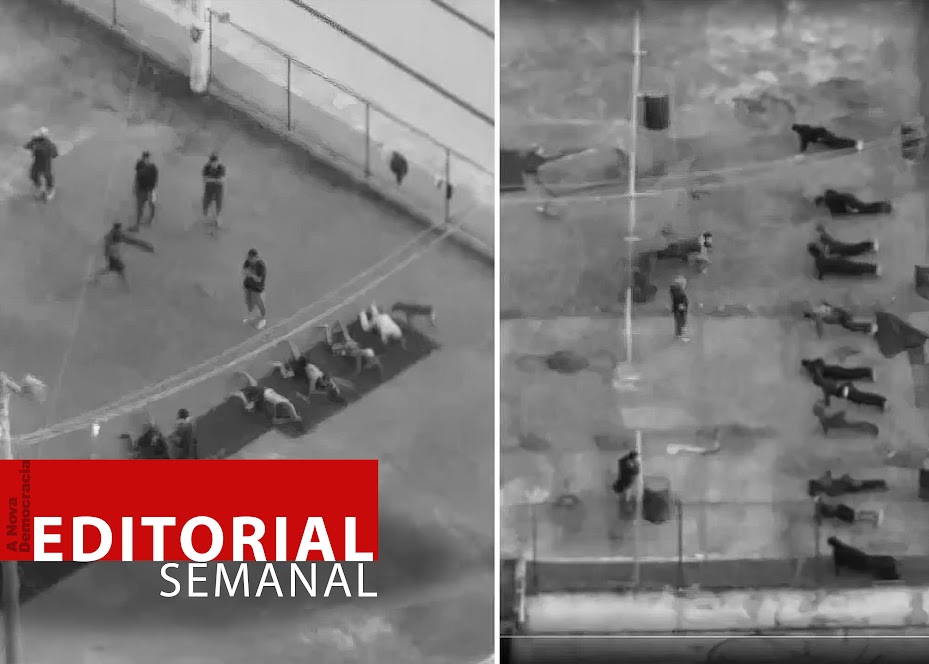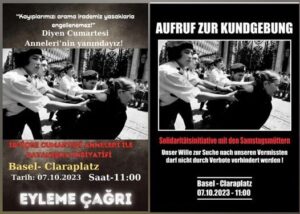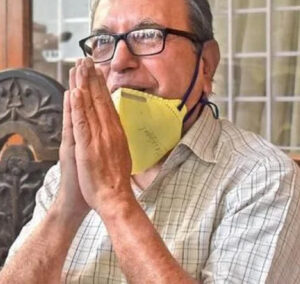
AND: Weekly Editorial – Back to the Crime Scene
We publish an unofficial translation of the article of A Nova Democracia of Brazil found on their webpage.
The scene of a dozen young people doing physical exercises and movements with rifles, in the Maré favela complex, in Rio de Janeiro, was transformed into the newest and ridiculous media spectacle. Posing as a defender of favelas and “identity entrepreneurship” over the last 8 years, Rede Globo [Translator’s note: TV channel from Brazil] could not help but expose the most genocidal nature that has always characterized it: it sounded its sinister trumpets and in an 11-minute report it compares those crude exercises (so poorly executed and poorly conducted) to the systematic training offered in the Armed Forces. It’s the signal that all the bloodthirsty far-right dogs want to is to escalate the war against the people. The bolsonarist Cláudio Castro has already announced that there will be a mega-operation there, “with no end date”.
Luiz Inácio’s government is not far behind and soon offers the National Force and even the Navy to intervene militarily that territory. “The situation in Maré has reached a very serious point, there needs to be a response and the government is willing to help,” said the executive secretary of the Ministry of Justice.
Strange decision, if we see the following statement by Luiz Inácio in October 2022: “The problem with the poorest communities in Brazil is that the State only appears when it has a problem to solve, thinking that the police are the solution”. How different is the Lula candidate and his government, right?
The military intervention in Maré is already defined behind the scenes and will be a resounding failure and will erupt into new popular rebellions against the unjust war, as was the case in Alemão (2010) and in Maré itself (2014), both also on orders from the PT government. Luiz Inácio and Rede Globo, who try to present themselves as the antipode of Bolsonaro and Bolsonaro’s supporters like Cláudio Castro, are all united on this issue. Everyone returns to the crime scene to repeat it.
*
Such criminal groups that roam the favelas are not the core of the drug trafficking problem. This is embedded in the Brazilian State, which is quickly becoming a narco-State. After all, everyone knows that drugs are produced abroad and arrive in the country mainly through the borders in the North and Central-West, for which the Army and other federal forces are responsible. Does the Army commander have anything to say about the strange ineffectiveness of his troops in this control? What can we say about General Carlos Alberto Mansur, former security secretary of Amazonas, the target of a police operation in August 2023 for participating in activities involving local drug trafficking? And what about the two Air Force officers, who worked in the Institutional Security Office of the presidency of the republic, who are investigated due to participating in the activity of drug-trafficking using airplanes of the Armed Forces?
Let’s go further. Let’s take the example of Luiz Carlos Rocha, “the white head”, considered in 2017 the biggest drug trafficker in the country and one of the biggest on the planet. He was not among the poor people in a favela in Rio or Salvador. He lived in the fortunate municipality of Sorriso (MT), the mecca of agribusiness. He had the title of agricultural businessman, a big landlord. The profits from the illegal business were laundered through money changer Alberto Youssef, the same man who did similar work with politicians involved in Operation “Lava Jato”. Luiz Carlos had deep relationships with Eudes Tarciso de Aguiar, an influential politician from Brasnorte (MT), who was considered the city’s greatest leader for having managed to elect Mauro Mendes as governor of the state and Jaime Campos as senator. It’s not too much to mention that all of them were, back then, in love with Bolsonaro. Luiz Carlos lived under a false identity, bribing as many authorities as he could. Does anyone believe he is an exception among his peers?
These are the true foundations of drug trafficking in the country: big businessmen, big landlords, authorities of the old State. Men of status who watch the operations in the favelas in their luxurious living room, living as warlords.

